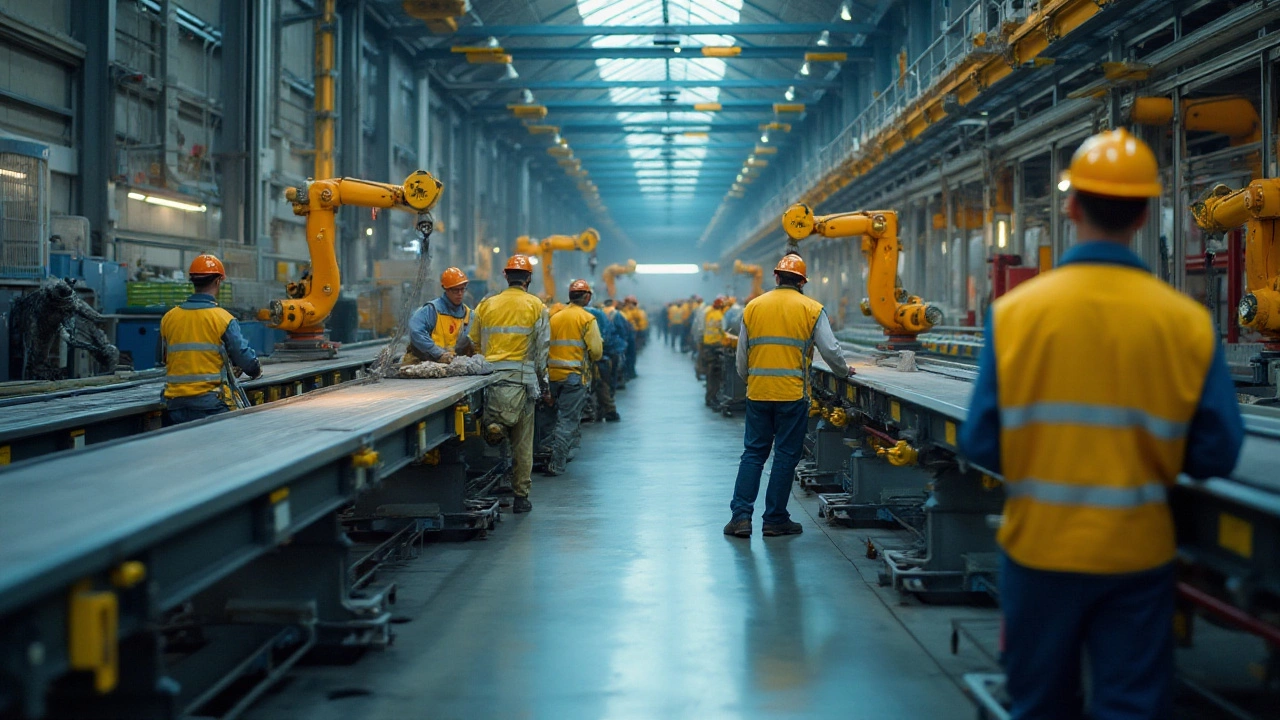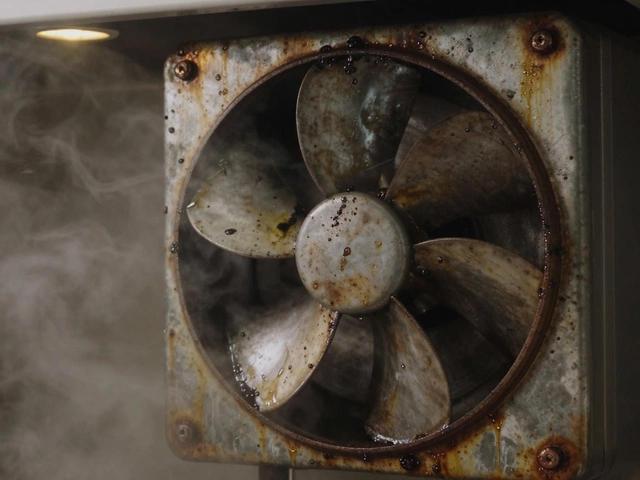In the realm of business operations, the term 'appliance' takes on a meaning that goes far beyond everyday home gadgets. These are the vital tools and machinery that companies rely on for success—spanning from simple office equipment to complex industrial machines. Just as a heart is indispensable to human life, appliances are integral to the functionality and productivity of any business.
Understanding what appliances are and how they function within a business setting is essential knowledge for anyone looking to harness their full potential. There's more to it than just purchasing equipment; businesses must adopt a strategic approach involving careful selection, diligent maintenance, and keeping an eye on emerging technology trends. These efforts ensure that equipment doesn't just survive, but thrives under the demand of modern-day operations.
- Defining Business Appliances
- The Importance of Appliance Selection
- Maintenance and Longevity
- Future Trends in Business Appliances
Defining Business Appliances
Business appliances are not a singular, narrow category of tools. Rather, they encompass a wide array of devices and machinery essential for the day-to-day operations of numerous organizations. Whether found in the bustling environment of a corporate office or embedded deep within the infrastructure of a manufacturing plant, these appliances are critical to sustaining productivity. In the simplest terms, a business appliance is any piece of technology or machinery that enables a business to perform its functions effectively. It could be a multifunction printer in an office, handling everything from printing and scanning to faxing, or a conveyor belt in a factory, streamlining the assembly process.
The significance of business appliances goes beyond their basic functionality. They are integral to creating a seamless workflow and ensuring that operations run smoothly. For example, in a retail setting, point-of-sale systems have revolutionized the checkout process, making transactions swift and error-free. Their convenience has also extended to stock management, reducing discrepancies and enhancing inventory accuracy. According to a study by Statista, about 73% of small businesses leverage at least one form of business appliance technology to boost productivity and reduce operational costs. This statistic alone underscores the prevalence and importance of these tools across various industries.
The variety of business appliances means that businesses must carefully consider their specific needs when choosing which equipment to invest in. It's crucial to assess factors like scalability, energy efficiency, and ease of integration with existing systems. For instance, when selecting IT hardware, companies must weigh compatibility with current software and future tech advancements. As technology evolves, so do the features and capabilities of business tools, often requiring businesses to update or replace older models to stay competitive. According to an IBM report, integrating smart appliances can result in up to 20% increased efficiency in operational processes, showing how technological adaptation can be a game-changer.
Moreover, the management of equipment is less about acquisition and more about maintaining a fine balance between functionality and cost. In this context, regular maintenance becomes a critical part of prolonging the lifespan of these appliances, ensuring they operate at optimal capacity without frequent breakdowns. Proper maintenance is not just about fixing what's broken; it's about preventing failures in the first place. Investing in service contracts or having in-house maintenance personnel can often save companies from costly repairs and significant operational downtime. As an old adage from the business world often suggests, ‘A stitch in time saves nine,’—being proactive can avert larger issues.
Bill Gates once remarked, "In business, the idea of measuring what you are doing, picking the measurements that count like customer satisfaction and performance… you thrive on that." Acknowledging the utility and impact of business appliances can dramatically enhance such measurements.

The Importance of Appliance Selection
Choosing the right business appliances is a critical decision that can make or break a company’s operational efficiency. These selections aren't merely about acquiring machines that perform tasks; it's about the strategic integration of tools to enhance agility, productivity, and sustainability. In our rapidly evolving business environment, where technology advances astoundingly fast, aligning appliance choices with business goals becomes paramount. Imagine a call center without the latest headsets, or a manufacturing unit operating with obsolete machinery—both scenarios point to decreased performance and higher costs. It accentuates the essential role of staying current in appliance technology.
The concept of appliance selection goes deep beyond necessity; it impacts long-term planning and investment. Businesses often find themselves at crossroads when deciding between the allure of cutting-edge technology and the pragmatism of tested reliability. Here, understanding specific needs and constraints becomes the guiding light. Different industries have varied requirements—what suits a healthcare facility might not fit a fast-paced tech startup. This diversity means that businesses must meticulously evaluate not just the initial cost of an appliance but also its total cost of ownership, which includes maintenance, energy usage, and scalability.
One must also consider how these appliance service selections align with the company culture and workflows. For instance, introducing high-tech, AI-driven gadgets in a setting where employees are not tech-savvy can lead to resistance and inefficiency. On the flip side, overlooking staff training while adding complex machinery can cripple a business unit. A balanced approach ensures that the human and machine elements work in harmony, enabling seamless integration and boosting employee morale as they feel equipped to handle state-of-the-art tools.
Making Informed Decisions
Informed decision-making requires a robust assessment of available options. Research plays a pivotal role in this process. Companies should investigate reviews, case studies, and testimonials, which can provide insights into the functionality and reliability of potential purchases. However, it’s crucial to differentiate between genuine feedback and promotional content. As expert efficiency consultant Sandy Lipton once said,
"Selecting the right appliance is not about the bells and whistles; it’s about the rhythm it creates in your workflow."By tapping into industry networks and professional associations, businesses can gather real-world insights from peers about the appliances they consider.
Moreover, understanding market trends helps businesses stay ahead of the curve. Sustainability is a growing focus, with many organizations excelling by choosing energy-efficient appliances that align with green initiatives. Such decisions not only contribute to environmental stewardship but often result in long-term cost savings due to reduced energy bills.
Embracing Future-Proof Technology
As technology continues to corner the market, future-proofing becomes another critical consideration. This involves anticipating technological advancements and choosing appliances that can adapt over time. For instance, investing in modular appliances that allow for upgrades ensures that businesses remain competitive without recurring colossal capital expenditure. Statistics show that companies investing smartly in adaptable technology outperform their peers significantly. Consider a study where businesses that favored adaptable equipment noted a 20% increase in return on investment over five years compared to those that opted for immediate cost-cutting solutions.
The art of appliance selection in business is multifaceted, aligning financial prudence with strategic foresight. It empowers companies not just to perform but to thrive amid challenges. Understanding and implementing a well-rounded approach towards appliance selection fosters resilience and growth, laying a foundation for sustained operational excellence.

Maintenance and Longevity
Maintaining business appliances is not merely about keeping things tidy; it's a critical component of ensuring operational longevity and efficiency. Regular maintenance can vastly extend the life of appliances, keeping them in prime condition and minimizing unexpected breakdowns. A well-maintained appliance not only operates more efficiently, but it also uses less energy, reducing the overall operational costs—as supported by numerous studies indicating a significant drop in energy consumption with appliances regularly serviced.
Consider the example of commercial air conditioners, which are integral to many businesses. These units, when maintained periodically, show marked reductions in energy consumption—often by up to 15%, which is a stark difference for any business's bottom line. Such upkeep involves the regular cleaning of filters, inspection for leaks, and ensuring that the refrigerant levels are optimal. According to the U.S. Department of Energy, these steps are vital in saving costs and ensuring comfort for employees and clients alike.
"An ounce of prevention is worth a pound of cure," noted Benjamin Franklin, highlighting the timeless truth that investments in preventive maintenance pay off significantly in the long run. This is more relevant now than ever, especially in a market where cutting-edge performance is a non-negotiable demand.
Let’s delve deeper into some systematic steps for maintaining business appliances. First, businesses should establish a schedule for routine checks based on the manufacturer’s recommendations—often, this involves quarterly inspections. Businesses should maintain records of these checks to track appliance health over time, helping to identify patterns that might signal larger issues. Second, educating staff on proper usage techniques and basic troubleshooting can prevent many common problems before they arise. This involves training sessions, potentially facilitated by appliance manufacturers, and the creation of easy-to-follow manuals.
Finally, addressing repairs swiftly is crucial. Procrastination in fixing minor issues can lead to more significant damages, spiraling repair costs, and halting operations. It's akin to the proverbial domino effect, where one small piece tips others over. Partnering with reliable appliance service providers ensures that expertise is on hand to handle these challenges swiftly. Here is a simple routine to follow to keep the appliances in check:
- Regularly inspect and replace worn-out parts.
- Lubricate moving parts as necessary to reduce wear and tear.
- Test appliances for consistent performance and efficiency.
- Adopt a cleaning schedule to prevent dust buildup.
When businesses prioritize maintenance, they not only avoid downtime but also optimize the longevity of their critical equipment. This foresight translates to better performance and returns. So, maintaining business equipment is not just wise—it's essential for sustainable business success.

Future Trends in Business Appliances
As we venture further into the digital age, the landscape of business appliances is undergoing a transformative shift, influenced by technology and evolving business needs. One of the prominent trends is the rise of smart appliances, characterized by their connectivity and ability to streamline operations through artificial intelligence. These appliances not only reduce human error but also offer predictive maintenance capabilities, ensuring that unexpected downtimes are minimized. Companies are increasingly investing in appliances that can 'talk' to each other, creating an interconnected network that shares data seamlessly across departments. This not only enhances efficiency but also allows for a more cohesive workflow, akin to a well-orchestrated symphony.
Another significant trend is the emphasis on sustainability and energy efficiency. As global awareness of environmental issues grows, businesses are seeking appliances that not only lower utility costs but also reduce their carbon footprint. Energy Star-rated appliances are becoming a staple in businesses aiming to align themselves with eco-friendly practices, appealing to environmentally-conscious clients and customers. As noted by the Energy Information Administration, commercial buildings account for approximately 40% of total U.S. energy consumption, making the shift toward energy-efficient appliances both a financial and an ethical imperative.
The evolution of business appliances is also marked by customization and flexibility. In a world where one-size-fits-all is no longer viable, businesses are moving towards tailored solutions that cater specifically to their operational needs. This has given rise to modular appliances, which allow businesses to adjust their capabilities by adding or removing components as required. Such adaptability not only supports business growth but also ensures that companies can swiftly respond to market changes without overhauling their entire appliance inventory.
Technology's rapid advancements have ushered in appliances that incorporate IoT (Internet of Things) capabilities, fostering a more integrated work environment. These appliances collect and analyze data in real-time, helping businesses to make informed decisions swiftly.
"IoT-enabled appliances are game-changers for businesses looking to optimize their operations and enhance productivity," says Karen Strong, a renowned tech analyst. "They are not just a trend; they are the future of smart business management."The convergence of IoT with business appliances could lead to unprecedented efficiencies, transforming how industries like manufacturing, hospitality, and healthcare operate daily.
Finally, the sphere of cybersecurity is gaining prominence as new appliances connect to digital networks. Businesses are now, more than ever, required to protect their systems from potential cyber threats. This has sparked a demand for appliances equipped with robust security features, ensuring data protection and integrity. As businesses continue to integrate more advanced appliances, safeguarding operations against cyber threats becomes a pivotal consideration, shaping the future of appliance design and functionality.







